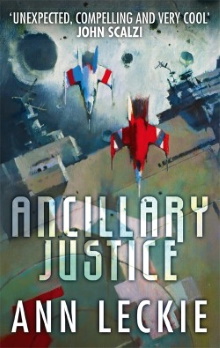Ever since I made a more concerted effort to keep up with the winners of recent awards, I’d had mixed success. It’s probably because I prefer hard science-fiction above all and this preference doesn’t track very closely with the type of work that usually wins in awards ceremonies. This book won a lot of awards and was Ann Leckie’s debut novel to boot. It’s more space opera than science-fiction and I have some issues with how casually it treats the existence of AI. But it is a very strong novel that does make me want to read more about the universe it is set in.
In the present, Breq is on an icy planet on a self-imposed mission. She is tracking down the owner of an alien weapon that can defeat the defenses of the Radchaai whose empire dominates human space. Along the way she meets and impulsively helps Seivarden, a former Radch soldier who has become an addict. A parallel narrative relates her backstory nearly 20 years ago. Breq is actually the AI of a large starship Justice of Toren whose mind controls both the ship itself and the thousands of corpse soldiers, called ancillaries, the ship carries. While occupying the planet of Shis’urna recently annexed by the empire, the Justice of Toren and her favored officer, Lieutenant Awn, are embroiled in a plot to destabilize the local community. They eventually realize that the person behind the plot is actually the Lord of the Radch herself, Anaander Mianaai. Those events fuel Breq’s drive for vengeance to kill Mianaai with the alien weapon, even though she inhabits innumerable bodies and is effectively immortal.
As usual, taking your first step into an original science-fiction world is daunting, and this truly is its own fully developed universe. There’s a human empire that spans many star systems, rival polities including alien ones on the periphery, the empire has its own unique culture, unique technologies at play, political intrigue etc. It’s impressive how this book manages to fit all that in and it does so effectively too. The most distinctive feature of the worldbuilding is that the Radch culture and language doesn’t distinguish people by gender. As such the Radch all use what we think of as female pronouns in a gender neutral manner to refer to everyone. We do get clues about the genders of the characters when they interact with non-Radch but the point is force the reader to think of gender as being a significant part of anyone’s identity at all. This doesn’t really have much of an effect on the plot and isn’t even a major theme but it is a pretty cool idea.
While I enjoyed the story and finding out more about this universe, it is space opera and not science-fiction. The sapience of the AIs that control the ships and possibly thousands of soldiers at a time is taken for granted. The fact that Mianaai and perhaps other human officers, possess command codes to compel the AIs’ obedience isn’t treated as being morally significant at all. Even if the AIs are sapient, it’s seems strange to me that they are intelligent in the same way that humans are given how differently their minds must work. It seems to me that trapped in a single human body with limited processing power and senses, the ship Justice of Toren should have gone insane from the mental trauma. The level of technology available doesn’t make much sense to me either. The Radch soldiers all possess extremely tough armor that is seemingly implanted into them and can be deployed at will. It sort of reminds me of Iron Man’s nanosuit I suppose. Yet they seem to fight with guns that fire bullets and the very scary alien weapon is merely a gun with bullets that can seemingly penetrate any armor.
Overall I found that this makes for a decently exciting story with enough of a woke sensibility to make it feel hip. It’s also suitably epic in scope and ambition with so much going on that it makes for a satisfying read. I don’t think that there is ever much of a mystery about who the antagonist is and the novel overplays the drama over the multiple versions of Mianaai. I think that since the versions have diverged so much one from the other, it makes more sense to accept that they have become different people and name them differently. Anyway this was entertaining enough to make me want to read more even if it didn’t quite blow me away. However while checking out the sequel, I noticed that the reader reviews were all pretty bad. It seems that while this first novel ends with the Radchaai in a state of great turmoil, Justice of Toren remains on the sidelines of major events in the second book. That’s enough to give me second thoughts.
